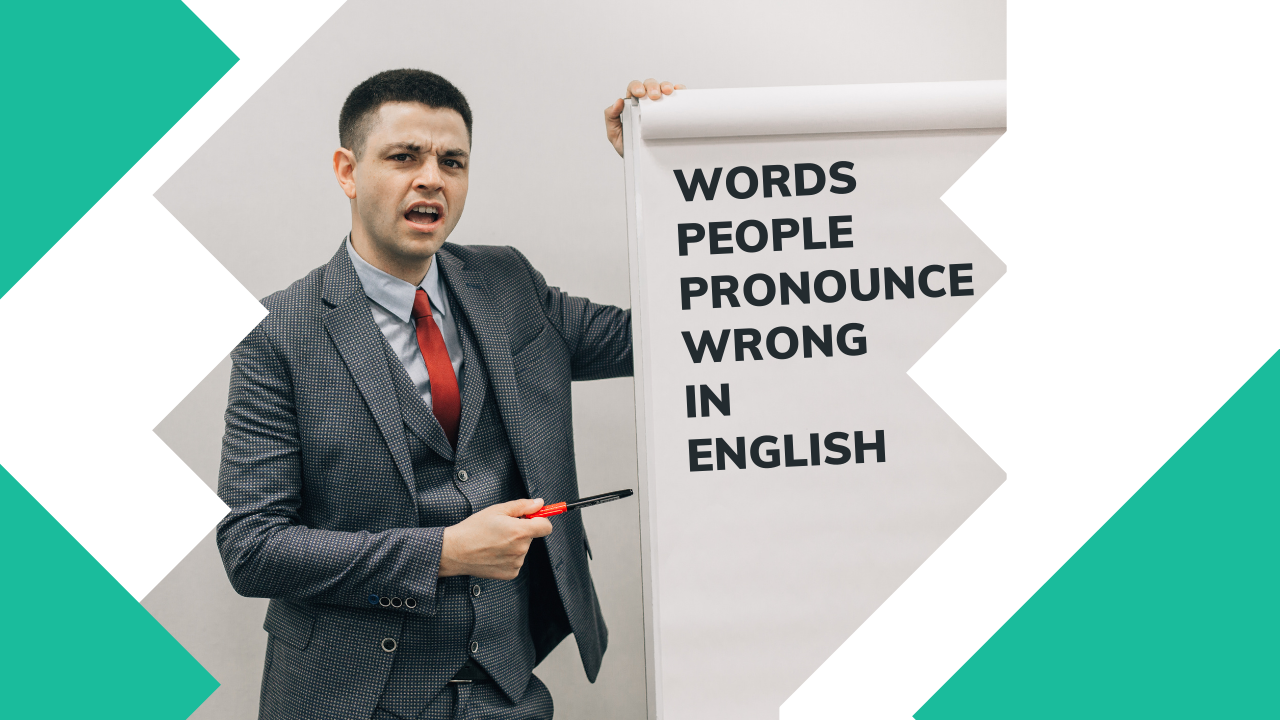Words People Pronounce Wrong in English

If you’ve been learning English for a while, you know English is not a phonetic language. A phonetic language is one in which the letters match a sound and they always follow their pronunciation rules. This means that words are spelled in the same way that they are pronounced. Unfortunately, this is simply not the case in English.
This leads to challenges when non-native English speakers learn a word in written form but don’t know how to pronounce the word in spoken English. It can take a lot of trial and error, however, non-native English speakers can master English pronunciation and sound like a native English speaker with time and practice.
Why People Some Words Pronounce Wrong
It’s common to mispronounce words when you’re learning a language and many culprits cause this to happen. Mispronunciation can happen when you’ve learnt a new word in a book or when you learn the pronunciation of a word incorrectly at school.
There are many things to take into consideration when learning to pronounce a word correctly - and missing any one of the elements of pronunciation can cause someone to mispronounce a word.
In English, we need to know how many syllables are in a word and which syllable is stressed, which syllable takes secondary stress, and how the vowels in the word are pronounced.

Some words only have three syllables but look like they should have four syllables, and other short words look like single-syllable words but have more than one syllable. If we look at a short word like ‘era,’ we might think that it is a single-syllable word. However ‘era’ is a two-syllable word. In contrast, vegetable looks like a four-syllable word, but it only contains three syllables.
Once you’ve mastered finding the number of syllables, you will need to find the stress in the word. Some words only have one stressed syllable. Others have both primary and secondary-stressed syllables. Syllable stress is important because we can change the entire meaning of some words by changing the stress. The word ‘important’ has three syllables and ‘POR’ is the stressed syllable. If we change the syllable stress to ‘IM,’ then the word sounds like ‘impotent’ - and calling an important person impotent is not something you want to do.
Tips and Tricks For Good Pronounce in English
A native English speaking partner is the best first option for learning how to pronounce words correctly. The next best option is finding a YouTube video with a native speaker saying the word. If you can’t find a video of a native speaker saying the word then look the word up in an online dictionary. Online dictionaries usually have an option to listen to the word. Listen, repeat and record yourself to improve your pronunciation on your own. If you don’t have access to an online dictionary then you can use a standard dictionary because it will have the phonetic spelling of the word.
The phonetic spelling of vegetable is /ˈvedʒ.tə.bəl/
In this example, we can see that each full stop (.) indicates a syllable and the apostrophe (‘) indicates the stressed syllable. The symbols that we use to write the phonetic script represent the sounds in English. Learning the English IPA will help you improve your English pronunciation.
Many non-native English speakers don’t know how to find an English speaking partner or they may lack the confidence to join English classes online, but there are countless benefits to having an English speaking partner. They can help you perfect your pronunciation skills and teach you the correct mouth position to produce English sounds correctly.
If you aren’t ready to join English classes or you simply want to know how to learn English pronunciation at home, then you need to use technology and the phonetic script. You will have no problem pronouncing new words that you read if you master the use of these resources.
What is English Everyday
English Everyday is an English course with 24/7 live speaking lessons for English learners who want unlimited speaking practice with native speakers, professional teachers, and students from around the world.
You have live speaking lessons where you can join an unlimited amount of lessons every day. There's a lesson almost every hour and you can join all of them and also, you can review all record lessons. English Everyday contains a lot of conversation practice for each level of English (A2, B1-B2, C1), and also you have a calendar of scheduled lessons so you can see when lessons are and at what time you can join and start speaking.
In English Everyday program, you have 24/7 support and also you have student chat where you can speak with other students from all around the world. You can look at our feedback page so that you can know from which countries our students are. Before you join our program, we strongly recommend you sign up for our free seminar with Kris Amerikos, where you can learn:
- What goals you need to have to get better results
- How to become fluent in English very quickly
- What you need to do to have perfect pronunciation
- The 3 biggest mistakes you need to avoid
- Which free resources will help you learn English
- The best resource to use to improve your speaking
15 Words People Pronounce Wrong in English
Pronouncing words incorrectly happens to the best of us. If we’re pronouncing words incorrectly then that means we’re learning. If we’re not making mistakes, then we’re not learning. Rest assured knowing that you are not the only one who is making these mistakes. Below is a list of 15 words that you’re probably saying incorrectly - and some useful hints to perfect your pronunciation.
Pronunciation
One of the most commonly mispronounced words is ‘pronunciation.’
This word is mispronounced because non-native English speakers try to form the noun ‘pronunciation’ from the verb ‘to pronounce.’ However, their pronunciations are different.
Pronunciation is a five-syllable word and it’s the second syllable ‘nun’ that most people mispronounce. Many people take the ‘noun’ from pronounce and add it to ‘pronunciation.’
‘Pronunciation’ /prəˌnʌn.siˈeɪ.ʃən/ and ‘pronounce’ /prəˈnaʊns/ have different sounds after the first /n/, however, non-native English speakers take the ‘noun’ from ‘pronounce’ and add it to ‘pronunciation’ to make the mispronunciation ‘pronounciation’ /prəˈnaʊn.siˈeɪ.ʃən/
If you want to make improve your pronunciation of the word pronunciation then make sure you say ‘nun’ instead of ‘noun.’

Often
You’ve likely heard native speakers both pronounce the /t/ in often and also leave the /t/ sound out entirely. According to most dictionaries, the /t/ sound is silent in ‘often.’
However, if you usually add the /t/ sound, you aren’t entirely wrong because many native English speakers do too.
Either/Neither
These two words are particularly tricky because they each have two possible pronunciations.
They can either be pronounced with the long ‘e’ sound:
Either /ˈiː.ðər/ (which sounds like ‘ee-ther’)
Neither /ˈniː.ðər/ (which sounds like ‘nee-ther’)
Or they can be pronounced with the long ‘i’ sound:
Either /ˈaɪ.ðər/ (which sounds like ‘eye-ther’)
Neither /ˈnaɪ.ðər/ (which sounds like ‘n-eye-ther’)
You can choose either one of these pronunciations and they are both valid pronunciations in both British and American English.
The long i and long e sounds are the only two options for the pronunciation of ‘either’ and ‘neither.’ We CANNOT use the long a sound, for example, to produce ‘n-aye-ther’ and ‘aye-ther.’ This is not a correct pronunciation of ‘either’ and ‘neither.’

Vegetable
You’ve probably mispronounced this word before. It’s a word that most English language learners mispronounce when they first learn it. It looks like it contains more syllables than it does and it can be difficult to find the stressed syllable.
Most English learners say: ‘ve-ge-ta-ble’ and separate the word into four syllables when it only has three syllables ‘vege-ta-ble.’
The second mistake English learners make is pronouncing the ‘table’ in ‘vegetable’ in the same way that we pronounce ‘table’ - as in the object in our dining rooms.
Vegetable /ˈvedʒ.tə.bəl/ has the schwa (/ə/) sound in ‘/tə.bəl/’ and the schwa is never stressed. So the next time you say ‘vegetable’ make sure that the /a/ sound is weak and not the long /a/ sound that we hear in ‘table’ /ˈteɪ.bəl/
Clothes
A common mistake non-native English speakers make when pronouncing this word is focusing too much on the end -s sound. Most of the time an extra ‘-s’ is incorrectly added to clothes and it becomes clotheses.
If you struggle to pronounce this word correctly then change it for ‘close’ (as in ‘close the door’). The word ‘clothes’ can sometimes sound like ‘close’ when we’re speaking quickly - so no one will notice if you say ‘close’ instead of ‘clothes’ and it will sound more correct than ‘clotheses.’
If you do want to practice pronouncing ‘clothes’ correctly then focus on mastering the end ‘thes’ sound. There are two consonant sounds at the end of clothes. The first is ‘th’ /ð/ and the second is the ‘s’ sound which is closer to the /z/ sound. Practice making these two sounds next to each other /ðz/ and then add the ‘clo’ in the beginning. You can break up words that are difficult to pronounce into smaller parts to help perfect your pronunciation.
GIF
There has been a lot of debate around the pronunciation of ‘gif.’ That’s because the letter G has two sounds. It has the hard ‘G’ /g/ sound as in ‘gate, goat, gulp’ and the soft ‘G’ /ʤ/ sound as in ‘gem, gym, gist.’
If we follow the rule in English that says that the letter G makes the soft /ʤ/ sound when it’s followed by letters ‘e, y, or i’ then the pronunciation of GIF is JIF /ʤɪf/
Meme
Meme is another word that has come about thanks to the internet. Most people first saw this word in written form which made it difficult to figure out its pronunciation. The pronunciation is NOT me-me or maymay. The correct pronunciation of meme is meem /miːm/
Flautist
This word is commonly mispronounced because it’s unlikely that you’ve heard many people use it or have needed to use it yourself. A person who plays the flute is called a flautist, NOT a flutist.
When forming this word for the first time, we usually try to form ‘flautist’ from ‘flute’ by using the long ‘u’ sound. However, the correct pronunciation of ‘flautist’ is ‘flaw-tist’ /ˈflɑː.t̬ɪst/

Valet
‘Valet’ is a French word. Most words in English that come from French and end in ‘t’ have a silent ‘t.’ The ‘t’ is silent in almost every word that comes from French and ends in ‘t’ like ballet, gourmet, chalet and rapport.
Valet is pronounced va-lay and NOT va-let.
Pseudonym
Don’t let the spelling of this word frighten you. It’s fairly easy to pronounce once you learn the rules. The first rule is that the letter ‘P’ is silent, so it starts with an ‘S’ sound. Secondly, it is a three-syllable word and is broken up as pseu-do-nym. And finally, it’s pronounced SOO-da-nim /ˈsuː.də.nɪm/
Itinerary
The two ‘R’ sounds can be challenging to pronounce correctly but you will be able to master them with a lot of practice. Itinerary is a five-syllable word - i-tin-er-ra-ry. It’s pronounced ‘eye-TIN-a-re-ree’ /aɪˈtɪn.ə.rer.i/
Salmon
Salmon is another word with a pesky silent letter. The ‘l’ in salmon is silent and we do not say it.
Non-native English speakers make the mistake of saying ‘sal-mon’ instead of ‘sa-mon.’ It can be difficult to know when a letter is or isn’t silent. Knowing which letters are silent is something that non-native English speakers simply have to learn.
Subtle
‘Subtle’ is another word that has a silent letter in its pronunciation. In ‘subtle,’ the ‘b’ is silent. The correct pronunciation of ‘subtle’ is ‘su-tle’ and NOT ‘sub-tle.’
Stomach
There are two errors that non-native English speakers make when pronouncing ‘stomach.’ The first mistake is pronouncing the ‘o’ sound as the long ‘o’ sound which sounds like ‘s-toe-mach.’ The second mistake is pronouncing the letters ‘ch’ with the /ʧ/ sound of ‘cheese’ and ‘chair.’
The ‘o’ sound in ‘stomach’ is the short ‘u’ sound and the ‘ch’ is the /k/ sound. ‘Stomach’ should be pronounced ‘STU-mek.’
Important
Important is the best example of a word where syllable stress matters. Most people get the pronunciation of the letters in ‘important’ correct, however, some non-native English speakers put the stress on ‘im’ instead of ‘por.’
The correct pronunciation of ‘important’ is ‘im-POR-tant.’ If we say ‘IM-por-tant’ then it sounds like we’re saying ‘impotent’ which is another word with an entirely different (and offensive) meaning.









































